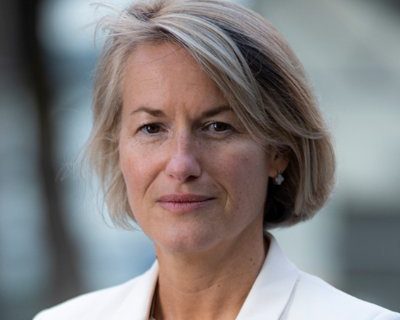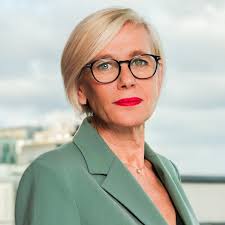An enhanced edition of the Climate Talks at the French Ministry of Environment
To mark the 30th anniversary of the Channel Tunnel, Getlink organised its 3rd Climate Talk at the French Ministry of Environment on 24 April, in the presence of Minister Christophe Béchu.
Created by Getlink as part of its Chair with the Toulouse School of Economics, Initiative for Effective Corporate Climate Action, the Climate Talks aim to enrich reflection on the impact of corporate activities on climate, share experiences, measure the costs associated with decarbonisation efforts and propose feasible solutions.
Yann Leriche, CEO of Getlink, was joined by 200 guests including the main French players in transport, mobility and logistics and their financial and institutional ecosystems, to discuss “Low-carbon transport for all: the big challenge!”
To introduce the debate, Vincent Ducros, CSR and Sustainable Development Director at Getlink, presented a keynote inspired by part of the Ecole Normale Supérieure Institute seminar, Transition at the Crossroads of Crises.
The debate gave panellists – Yann Leriche, Gwendoline Cazenave, CEO of Eurostar, Anne Rigail, CEO of Air France and Henri Poupart-Lafarge, Chairman and CEO of Alstom – the opportunity to discuss a series of means and solutions for decarbonising transport for all.
Should access to transport for travel be restricted or regulated?
The panellists were unanimous : constraint cannot be a lever for the ecological transition.
We need to focus ‘first and foremost on limiting carbon emissions, and this applies to all sectors’ (Yann Leriche), while at the same time supporting changes in behaviour, as can be seen for air travel with ‘a 40% drop in domestic journeys’ (Anne Rigail), ‘by moving away from punitive ecology’ (Gwendoline Cazenave) and by ‘making rail attractive in terms of fares and passenger comfort’ (Henri Poupart-Lafarge).
How can low-carbon modes of transport grow?
Growth in low-carbon transport cannot be achieved without massive investment to develop freight and to ‘ensure that the rail network is of equal quality to the road network’ (Yann Leriche), to ‘increase the capacity of stations’, which are already saturated, and attract new passengers (Gwendoline Cazenave) and finally to ensure that ‘equipment is more energy-efficient and can accommodate more passengers’ (Henri Poupart-Lafarge).
Should a low-carbon tax be introduced?
The investment required for the ecological transition means finding sources of funding.
The introduction of a carbon tax has ‘the advantage of allowing a redistribution to industries that need more funding to decarbonise’ (Yann Leriche). It is also essential that companies’ decarbonisation strategies “take into account the additional costs associated with the transition in order to ensure the sustainability of their business” (Anne Rigail) and that “strong political decisions are taken to lift a number of constraints that will accelerate the transition of the transport sector” (Henri Poupart-Lafarge).
What about the French public opinion on climate and transport issues?
Frédéric Dabi, Managing Director of Ifop, discussed how French people’s concern about climate change is growing all the time, demonstrating their willingness to take action and turn to the private sector to implement solutions to kick-start the ecological transition.
When it comes to transport, ‘the French overwhelmingly say they want to reduce car use and have greater access to shared modes of transport. This trend is still being held back by heavy reliance on cars and the low density of transport services available’ in certain areas, particularly rural ones.
The Minister of Environment concluded the discussions by pointing out that the construction of the Channel Tunnel has ‘brought people and economies closer together’, underlining that ‘400 trains a day run through it and 26% of the value of trade between the UK and France passes through the Tunnel’. The Minister also praised the ambitions of Getlink group, which is ‘about to go even further by increasing the frequency of trains and opening up new destinations, demonstrating the extent to which this rail backbone, and the way in which we are investing in low-carbon transport is highly topical’.
Following the speech made by Minister Christophe Béchu, the Getlink and TSE teams involved in the joint Chair awarded the 1st and 2nd prizes of the Challenge for Corporate Climate Action student competition, organised as part of this collaboration. Two projects were singled out and rewarded, each with an innovative entrepreneurial project contributing on its own scale to improve the ecological transition, by assessing the technical and financial conditions of its impact.
Low-carbon transport for all: the big challenge!






